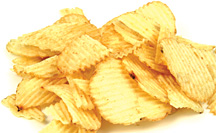Don't Fill Up on Empty Calories
By Dr. Donald L. Hayes
Many of the health risks people face today are a direct consequence of eating too much processed, vitamin- and mineral-deficient foods high in calories. In general, these foods are best described as containing "empty calories." Here's why empty calories are so dangerous and some common-sense steps to eliminate them from your diet.
Empty Calories: High in Calories, Low in Nutritional Value
Scientists throughout the world agree there are at least 40 nutrients that are essential to human health. Research shows that many people are woefully deficient in a number of these key nutrients. According to a report released several years ago by the U.S. Department of Agriculture's Dietary Guidelines Scientific Advisory Committee, more than half of Americans don't get enough calcium, vitamin E, fiber and potassium, and a majority of adults are deficient in vitamins A and C and magnesium. This is significant because provocative scientific evidence suggests that getting enough and the proper balance of necessary nutrients offers significant protection against weight gain, premature aging and other dangerous chronic diseases.
 All anyone has to do is look at the nation's expanding waistlines to know that deficiencies in nutrients are not due to the fact that we don't get enough to eat. The real culprit is the poor nutritional quality of what we eat - foods overloaded with calories and deficient in nutrition. In short, many of us are overfed but undernourished because we eat too many empty calories.
All anyone has to do is look at the nation's expanding waistlines to know that deficiencies in nutrients are not due to the fact that we don't get enough to eat. The real culprit is the poor nutritional quality of what we eat - foods overloaded with calories and deficient in nutrition. In short, many of us are overfed but undernourished because we eat too many empty calories.
In order to eliminate empty calories from your diet, you first need to know if you're eating them. The term empty calories refers to a group of foods that provide little to no nutritional value, yet still have calories in them - typically a lot of calories! That makes the term a bit deceiving, because the calories in these types of foods are actually anything but "empty." A typical selection of empty-calorie foods includes cakes, pies, beer, soft drinks, candy and French fries.
Since you must get the 40 essential nutrients to maintain good health, your body needs you to take in a certain amount of calories each day. However, if you eat more calories than your body can use, you will gain weight and may inherit all the well-known consequences that go along with obesity. And if you eat too few nutrients (nutrient deficiency), you may have health problems caused by a lack of necessary vitamins and minerals and possible malnutrition.
How to Eliminate Empty Calories From Your Diet
Go slow. Your primary strategy should involve slowly switching from consuming empty calories to eating more nutrient-dense foods. I emphasize the importance of making slow, gradual changes; if you make too many changes too fast, you will never be able to stick to it. Make one change a week and try to maintain it. For instance, many people find it easy as a first step to drink a nutrient-dense meal replacement shake for breakfast. If you do, make sure you choose one that is truly "nutrient dense" and not "calorie dense." When in doubt about which shake is best, always ask your health care provider for a recommendation.
Be smart when it comes to the food you eat. Gradually eliminate all foods made with high levels of sugar and white flour. Deep-fried foods, processed foods, and foods high in saturated and trans fats should also be gradually eliminated from your diet. Do it slowly, but remain determined to improve your long-term state of wellness. It's OK to have an occasional treat from these food types, but they should be a rare exception to your nutrient-dense, balanced diet.
Your best friends are fruits and vegetables. Fruits and vegetables are true miracle foods. If your idea of a vegetable is French fries and you're idea of fruit is a glass of orange juice, you've got a lot to learn. A growing body of evidence shows that eating real fruits and vegetables is absolutely critical to good health. Start by eating something familiar such as cucumbers, peppers or tomatoes. Enjoy oranges, bananas, grapes, watermelons and apples. Vegetables such as celery and carrot sticks make good substitutes for chips. Fruits can easily satisfy a sweet tooth. When you get accustomed to eating familiar types of both, you can get more adventurous with many other types. Here's a few suggestions to help you eat more fruits and vegetables:

